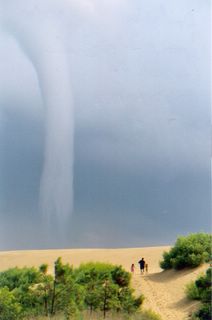USA Today: Flood insurance reform stalled
posted @ 6:45 PM
-
1 comments
Saw this piece in USA Today. It discusses the current state of the Federal Flood Insurance Program. Its not pretty.
"Recent flooding in the Midwest has brought the issue back to the forefront. Hurricanes Katrina and Rita, back-to-back storms in 2005, dispelled any notion that the insurance program was self-sustaining. They threw it roughly $20 billion into debt and called attention to major structural flaws. Nearly everyone acknowledges it cannot pay off the debt, much less pay for losses in future storms. But so far, Congress has done little more than raise the program's borrowing limit, essentially handing taxpayers a series of shaky IOUs."
I saw this article in a another anti-coast piece bashing subsidies for rich property owners. Criticisms that play well in public but don't reflect the reality of the limits of coverage and the economic benefit of rental cottages that provide the basis of our Outer Banks economy. Rental cottages are our Ford plant, our RTP.
This piece just points up the need for national leadership in reshaping our approach to natural and man-made disasters. We need a responsible national repsonse that includes an insurance component that combines the varied risks that our government is called on to respond to. Without a mandated insurance component we will continue to be expected to rebuild uninsured communities again and again. The politics of disaster will not allow this country to cut loose those who need our help most in spite of their choices not to properly prepare .
I don't hold much hope this will happen but that won't stop me from calling for change.
Ciao








1 Comments:
I guess I'm somewhere in between the article you linked and one I posted recently. I agree with the overarching concept of Flood Insurance, but I have issues with how the Federal Flood program rated premiums in the past. I suppose many don't realize that only the first $250,000 is eligible, so a million dollar needs $750,000 of private sector coverage. Many elect not to get that coverage, and then obtain low cost disaster relief loans or help from localities to rebuild if the "big one" hits. Private companies rate risk better than the Feds, but are notorious for trying to weasel out of paying claims. The entire concept makes my head hurt.
Post a Comment
<< Home